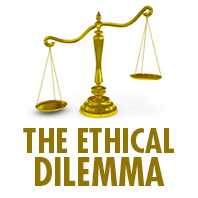The Ethical Dilemma: Is Forgiveness Divine? Should We Boycott the Boy Scouts?

Experiencing an ethical dilemma? Need advice from a humanist perspective?
Send your questions to The Ethical Dilemma at hnn@americanhumanist.org (subject line: Ethical Dilemma).
All inquiries are kept confidential.
Is Forgiving Divine, But Not Secular? Some religions make a big thing about forgiveness. You often see news stories about survivors of horrible crimes (sometimes the victim, but sometimes relatives of victims who were grievously injured or killed as a result of the crimes) who announce that they forgive because of their faith. What about those of us who don’t ascribe to any faith?
—Don’t Even Think About My Other Cheek
Dear Cheek,
I recently had the privilege of attending a talk with Emily Yoffe (a.k.a. Slate’s “Dear Prudence”), who said she is not into a policy of forgiveness, and particularly not if the perpetrator hasn’t even asked for it or apologized. She noted that having to live with guilt serves as the wrong-doer’s penance.
I agree that if someone who harmed you hasn’t even acknowledged doing you wrong, expressed remorse or tried to make amends, he or she doesn’t deserve your benevolence. But forgiveness is a personal decision, to be made based on individual dynamics and psychology, over time, and perhaps with the help of a therapist. I would never presume to tell another person, especially a victim of something with the enormity of the Boston bombings, whether–or not–to even think about forgiving. To err may be human, but some acts are so inhuman they’re monstrous. As the judge Portia observed in Shakespeare’s The Merchant of Venice, “The quality of mercy is not strained. It droppeth as the gentle rain….” For some people, forgiving may flow naturally no matter how egregious the crime. But straining to repress negative emotions can backfire and implode if you force yourself to forgive.
After you have been wronged is a time to think first about your own needs (and really, when is it not?). Regardless of how much (or how little) difference your absolution might make to your aggressor, consider whether it might make a difference to you if you hold a grudge that perhaps festers and spreads poison to other aspects of your life, versus if you choose to let it go so you can move on. If you feel the perp deserves forgiveness—for instance, a child who is learning to control her impulses, or a cherished friend who had a serious lapse in judgment but is likely to do better if given a second chance—you might be wise to kiss and make up. On the other hand, someone who truly did you harm—especially one who did it on purpose, with no regard for your welfare, and would do it again in a heartbeat—is someone it might be entirely appropriate to turn your back on, except if you decide to face her/him in court.
You may also consider whether proffering the olive branch would make your wrong-doer experience relief and healing, or, conversely, make him or her feel guilt-wracked and despicable—and then decide which reaction would make you feel better. Sometimes forgiveness can be the best revenge.
Atheist Boy Scouts: Now that it seems the Boy Scouts are changing their policies to accept gay boys, the next big thing is that they don’t accept atheists. I’ve been hearing that some LGBT groups are really upset about atheists attempting to hitch a ride into the organization on their coat tails
It’s so distressing that people who have been the victims of prejudice themselves can turn right around and direct the same kind of hostility toward another group. Instead of seeking acceptance, shouldn’t everyone who’s excluded (and everyone who stands with them) just forget about the Boy Scouts and let them continue their discrimination until they are extinct?
—Wouldn’t Want To Join A Club That Wouldn’t Allow Me To Be A Member
Dear Member,
It’s ironic and sad that there are LGBT groups who don’t want to be lumped together (or bunked together) with atheists. These groups see themselves as upstanding god-fearing people who want nothing to do with nonbelievers and resent any suggestion they have anything in common. They need to come around about non-religious people the same way mainstream America has been coming around about LGBTs.
But simply turning away from the Boy Scouts is not ideal. In its long history, the BSA has provided wonderful opportunities for the kids they serve. Thousands of young men have learned useful life skills and values through scouting, and the program has undoubtedly kept many out of trouble and in constructive activities and achievements. While I’m not aware of any comparable group that could be substituted, there certainly are grassroots organizations in many communities that offer similar programs (often in a coed environment).
So until the BSA accepts nonbelievers, I’d encourage seeking out other organizations that offer those kinds of activities. But at the same time, we need to keep up the pressure on the BSA to accept avowed atheists both as scouts and leaders. Why shouldn’t our kids and the would-be mentors among us have the same opportunity as religious and gay people to earn a sash-full of merit badges and pass along valuable skills we’ve mastered? Eagles have no religion; why should Eagle Scouts?
